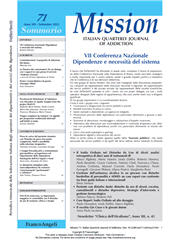Psychosocial Dimensions of Substance Use Disorders in Apulia : Insights from the project BioSUD
8-14 p.
Substance Use Disorders (SUDs) represent a major global public health concern, shaped by a complex interplay of neurobiological, psychological, and sociocultural determinants. This study, conducted within the framework of the BioSUD initiative in Apulia, Southern Italy, investigates the psychosocial profiles and substance use patterns of 1,806 participants, comprising 298 individuals with a clinical diagnosis of SUDs and 1,508 non-clinical controls. Group differences emerged in educational attainment, employment status, exposure to adverse life events, family history of substance use, psychiatric comorbidity, and the quality of interpersonal relationships. Individuals with SUDs reported markedly higher consumption of nicotine, alcohol, cannabis, cocaine, heroin, and other substances, with polydrug use, particularly involving cocaine and heroin. Craving intensity was significantly elevated among clinical participants across all dimensions: reward craving (seeking pleasurable effects),
relief craving (alleviating negative emotional states or withdrawal), and obsessive craving (persistent, intrusive thoughts related to substance use). These findings highlight the need for integrated interventions that address not only substance use but also the psychosocial vulnerabilities contributing to addiction. Early screening, especially in adolescents and young adults, paired with efforts to strengthen protective factors such as supportive relationships, school engagement, and coping skills, is key to prevention. As part of the broader BioSUD initiative, combining psychosocial data with genetic profiling may further improve early risk detection and guide personalized prevention and treatment strategies. [Publisher's text]
32392 characters
-
Artículos del mismo número (disponibles individualmente)
-
Información
Código DOI: 10.3280/mis71-2025oa20598
ISSN: 2037-4798
MATERIAS
KEYWORDS
- Substance use disorders, psychosocial risk factors, Addiction, Craving, BioSUD initiative


